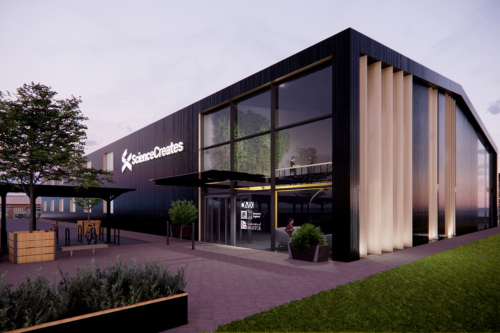Deep tech incubator Science Creates has secured £8.5m to open a third facility in Bristol, UK, focusing on quantum computing and bioengineering. The incubator, funded by Research England and the University of Bristol, will provide research and lab space to around 275 spinout companies. The new 30,000 sq ft building will increase Science Creates’ total incubator space by 65% to 75,000 sq ft. The company, founded in 2015, supports deep tech spinouts from the South West of England. The new facility is part of Bristol’s growing tech ecosystem, which includes one of Europe’s most powerful supercomputers.
Science Creates Secures Funding for New Tech Incubator in Bristol
Deep tech incubator Science Creates has secured £8.5m in funding to open a third facility in Bristol. The new incubator will be situated at the Temple Quarter Enterprise Campus and will provide research and lab space for approximately 275 spinout companies. The funding for the incubator was provided by Research England, a part of UKRI, the government’s research agency, and the University of Bristol.
The new facility is set to open next year and will increase Science Creates’ total incubator space by 65% to 75,000 sq ft. Science Creates, established in 2015, provides incubators, investment, and business support to deep tech spinouts from the South West of England.
The Role of UK Spinouts in the Fourth Industrial Revolution
Harry Destecroix, founder of spinout Ziylo and founder of the Science Creates ecosystem, stated that UK spinouts are, and will be, driving the fourth industrial revolution. The aim is to assist world-class engineers and scientists who have made significant technological breakthroughs, to build impactful deep tech companies. This will contribute to the health of the human race and the planet. The additional physical infrastructure will allow deep tech companies to scale and emerge.
Expansion of Science Creates Facilities
The new 30,000 sq ft building will be the third opened by Science Creates. The company opened its first site at St Phillips in 2017 and a second in Old Market in 2021. Dr Jon Hunt, the University of Bristol’s executive director for research, enterprise and innovation, expressed hope that many of these companies will thrive and grow to help deliver on their mission to make a positive impact locally, nationally, and globally by addressing society’s greatest challenges.
Science Creates’ Early-Stage VC Branch and Accelerators
In 2020, Science Creates launched an early-stage VC branch, called SCVC, and plans to launch accelerators in 2023 in partnership with UKRI. This marks a significant boost for Bristol’s tech ecosystem, especially after the government announced that the city would become home to one of the most powerful supercomputers in Europe.
Bristol’s Tech Ecosystem and the Role of Supercomputers
The supercomputer will be used to train large language models, a subset of artificial intelligence used in systems like advanced chatbot ChatGPT. The new incubator follows the publication of the UK’s spinout review, which was widely welcomed by both universities and investors. This development further strengthens Bristol and Bath’s regional tech report.
“UK spinouts are, and will be, driving the fourth industrial revolution,” said Harry Destecroix, founder of spinout Ziylo and founder of the Science Creates ecosystem. “All we want to do is help world-class engineers and scientists who have discovered important technological breakthroughs, to build impactful deep tech companies. This will improve the health of the human race and the health of our planet. The additional physical infrastructure will allow deep tech companies to scale and emerge.”
“The new incubator, located in the heart of our new Temple Quarter Enterprise Campus, will help create the next generation of deep tech spinouts, in quantum, cyber, engineering biology and much more,” said Dr Jon Hunt, the University of Bristol’s executive director for research, enterprise and innovation. “I hope and expect many of these companies will thrive and grow to help us deliver on our mission to make a positive impact locally, nationally, and globally by addressing society’s greatest challenges.”
Executive Summary
Deep tech incubator Science Creates has received £8.5m funding to open a third facility in Bristol, providing research and lab space to around 275 companies specialising in areas such as quantum computing and bioengineering. The new incubator, set to open next year, will increase the total incubator space by 65% and aims to support the growth of deep tech companies, contributing to technological advancements and societal challenges.
- Deep tech incubator Science Creates has secured £8.5m funding to open a third facility in Bristol, UK. The facility will cater to spinouts in fields such as quantum computing and bioengineering.
- The new incubator will be located at the Temple Quarter Enterprise Campus and will provide research and lab space to around 275 spinout companies.
- The funding was provided by Research England, part of UKRI, the government’s research agency, and the University of Bristol.
- The new site, opening next year, will increase Science Creates’ total incubator space by 65% to 75,000 sq ft.
- Harry Destecroix, founder of Ziylo and the Science Creates ecosystem, stated that the aim is to support engineers and scientists who have made significant technological breakthroughs.
- The new 30,000 sq ft building will be the third opened by Science Creates, following sites at St Phillips in 2017 and Old Market in 2021.
- Dr Jon Hunt, the University of Bristol’s executive director for research, enterprise and innovation, expressed hope that the new incubator will help create the next generation of deep tech spinouts.
- In 2020, Science Creates launched an early-stage VC branch, SCVC, and plans to launch accelerators in 2023 in partnership with UKRI.
- The new incubator follows the publication of the UK’s spinout review, which was welcomed by universities and investors.

